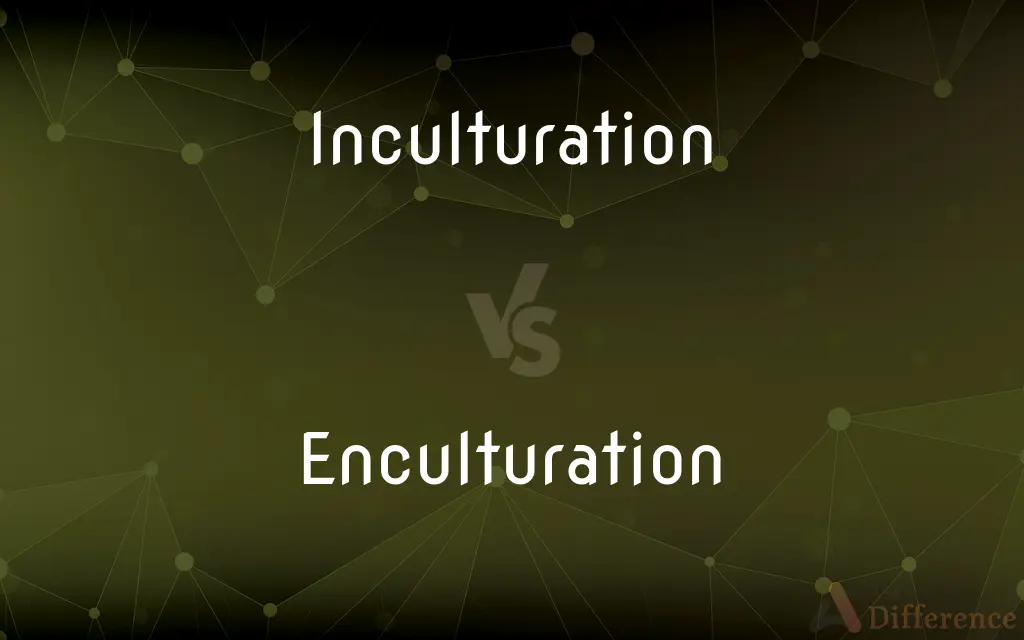Inculturation vs. Enculturation — What's the Difference?
By Tayyaba Rehman & Urooj Arif — Updated on April 5, 2024
Inculturation involves adapting church practices to local cultures, highlighting integration, whereas enculturation is the process of learning one's own culture from birth, emphasizing acquisition.

Difference Between Inculturation and Enculturation
Table of Contents
ADVERTISEMENT
Key Differences
Inculturation is a process particularly relevant in religious contexts, where religious practices and teachings are adapted to local cultural norms and values to make them more meaningful and accessible to a specific cultural group. It is a dynamic, two-way process that allows for a dialogue between faith and culture, with the goal of integrating religious expressions in a way that respects cultural identity. Enculturation, on the other hand, refers to the general process by which individuals learn and adopt the values, norms, customs, and social patterns of their own culture from birth, through family, education, and social interactions, without necessarily involving any religious elements.
While inculturation specifically addresses the challenge of making religious practices culturally relevant and respectful, enculturation is a broader concept that encompasses the entire spectrum of learning one's culture. For example, through inculturation, a Christian church service might incorporate local music styles to reflect the community's cultural identity, whereas enculturation would include learning that music style as part of the community's cultural heritage, alongside language, social norms, and other cultural practices.
Inculturation is often intentionally pursued by religious organizations and leaders who seek to make their faith's teachings more accessible and meaningful to diverse cultural groups. This can include translating religious texts into local languages, adapting liturgical practices, or integrating local customs and traditions into religious ceremonies. Enculturation, by contrast, occurs naturally and unconsciously as part of growing up within a culture, learning its language, customs, and social norms through everyday experiences and interactions.
The importance of inculturation lies in its potential to bridge cultural divides and foster a deeper understanding and respect among different cultural groups within a religious tradition. It acknowledges the value of cultural diversity and seeks to express religious truths in ways that are culturally resonant. Enculturation, however, is critical for the survival of cultural identity, ensuring that cultural knowledge, values, and practices are passed down to future generations, thereby maintaining the continuity and cohesion of the community.
Both processes are crucial for cultural and religious identity, but they operate in different contexts and serve different purposes. Inculturation emphasizes the adaptation and integration of religious practices within the cultural context, aiming for a harmonious relationship between faith and culture. Enculturation, meanwhile, focuses on the transmission of cultural knowledge and practices to ensure the individual's successful integration into their community and the preservation of cultural heritage.
ADVERTISEMENT
Comparison Chart
Definition
Adapting religious practices to align with local cultural norms.
Learning and adopting the norms and values of one's native culture.
Context
Religious
Cultural
Purpose
To make religious practices culturally relevant.
To integrate individuals into their native culture.
Process
Often deliberate and involves active adaptation.
Natural and unconscious process of cultural assimilation.
Focus
Dialogue between faith and culture.
Transmission of cultural knowledge and norms.
Compare with Definitions
Inculturation
Adaptation of religious elements.
The inculturation process might involve incorporating indigenous music into Christian worship services.
Enculturation
Learning one's culture from birth.
Through enculturation, children learn their community's language and social norms naturally.
Inculturation
Dynamic, two-way process.
Inculturation requires feedback and adaptation, allowing religious practices to evolve with cultural changes.
Enculturation
Involves assimilation of norms and values.
Enculturation teaches the values of respect and community shared within a culture.
Inculturation
Aims for cultural relevance.
By adapting religious symbols to local understandings, inculturation makes faith more accessible.
Enculturation
Universal and ongoing process.
As cultures evolve, the process of enculturation adapts to include new norms and technologies.
Inculturation
Integrates faith with local culture.
Missionaries focusing on inculturation strive to preach the Gospel in culturally sensitive ways.
Enculturation
Occurs through family and social interactions.
Family traditions and schooling play key roles in the enculturation process.
Inculturation
Promotes intercultural understanding.
Inculturation has led to the creation of unique forms of worship that reflect a blend of global faith and local tradition.
Enculturation
Critical for identity formation.
Enculturation helps individuals understand their cultural identity and role within society.
Inculturation
In Christianity, inculturation is the adaptation of Christian teachings and practices to cultures. This is a term that is generally used by Catholics, whereas Protestants, especially associated with the World Council of Churches, prefer to use the term "contextual theology".
Enculturation
Enculturation is the process by which people learn the dynamics of their surrounding culture and acquire values and norms appropriate or necessary to that culture and its worldviews. As part of this process, the influences that limit, direct, or shape the individual (whether deliberately or not) include parents, other adults, and peers.
Inculturation
To adapt (the public practice of a religion) to the specific conditions of a given culture in order to facilitate that culture's acceptance of the religion.
Enculturation
The process by which an individual adopts the behaviour patterns of the culture in which they are immersed.
Inculturation
The adaptation of Christian teachings in a non-Christian culture.
Enculturation
The adoption of the behavior patterns of the surrounding culture;
The socialization of children to the norms of their culture
Common Curiosities
Why is enculturation important?
Enculturation is crucial for cultural continuity, helping individuals understand and integrate into their cultural heritage and social structures.
How are children enculturated?
Children undergo enculturation through family, education, and social interactions, learning the language, values, and customs of their culture.
How does enculturation differ from inculturation?
Enculturation is the broad process of learning one's own culture, while inculturation specifically focuses on adapting religious practices to fit cultural contexts.
Can inculturation promote religious conversion?
By making religious practices more culturally relevant, inculturation can facilitate understanding and acceptance, potentially encouraging conversion.
Can inculturation change the core of religious beliefs?
Inculturation aims to express religious beliefs in culturally relevant ways without altering the core tenets of the faith.
How does globalization affect enculturation?
Globalization introduces new cultural elements, technologies, and ideas, making enculturation a more dynamic and complex process.
What is inculturation?
Inculturation is the adaptation of religious practices to local cultures, making faith expressions culturally relevant.
Is enculturation a conscious process?
Enculturation is largely unconscious, with individuals absorbing cultural norms and values through everyday experiences.
Can inculturation lead to syncretism?
While inculturation seeks to respect cultural differences, it must be carefully managed to avoid syncretism, which blends religious beliefs in ways that may dilute core doctrines.
What is the goal of inculturation in education?
In religious education, the goal of inculturation is to teach faith in a way that resonates with the students' cultural backgrounds and experiences.
How do cultures change through enculturation?
Cultures evolve as new generations incorporate contemporary values and practices, influenced by changing social contexts and technologies.
How can communities balance tradition and change in enculturation?
Communities balance tradition and change by valuing cultural heritage while also embracing new, relevant practices that reflect current societal norms.
What role do missionaries play in inculturation?
Missionaries often facilitate inculturation by translating religious teachings into local languages and adapting worship practices to respect cultural traditions.
What challenges does inculturation face?
Inculturation faces challenges in balancing faithfulness to religious traditions with respect for cultural diversity and changing social values.
How does enculturation affect identity?
Enculturation plays a key role in forming personal and cultural identity, influencing one's sense of belonging and community participation.
Share Your Discovery

Previous Comparison
Metaphor vs. Irony
Next Comparison
Syncopation vs. OffbeatAuthor Spotlight
Written by
Tayyaba RehmanTayyaba Rehman is a distinguished writer, currently serving as a primary contributor to askdifference.com. As a researcher in semantics and etymology, Tayyaba's passion for the complexity of languages and their distinctions has found a perfect home on the platform. Tayyaba delves into the intricacies of language, distinguishing between commonly confused words and phrases, thereby providing clarity for readers worldwide.
Co-written by
Urooj ArifUrooj is a skilled content writer at Ask Difference, known for her exceptional ability to simplify complex topics into engaging and informative content. With a passion for research and a flair for clear, concise writing, she consistently delivers articles that resonate with our diverse audience.















































